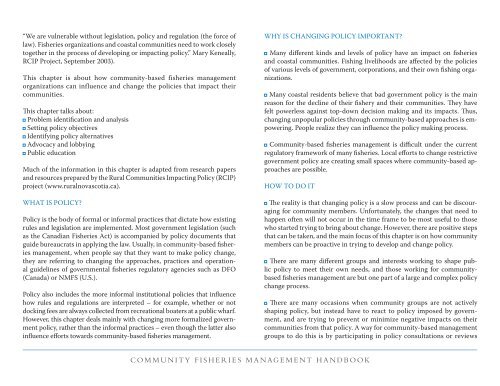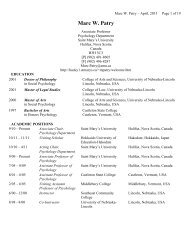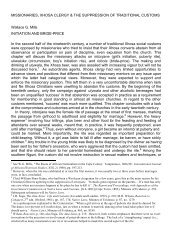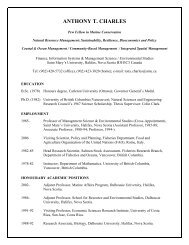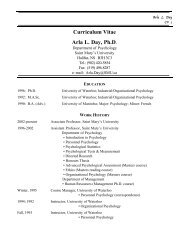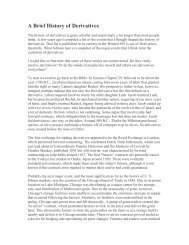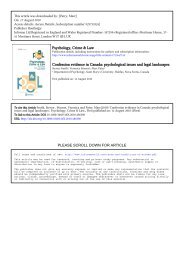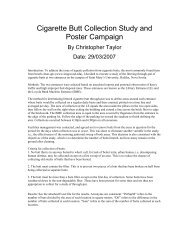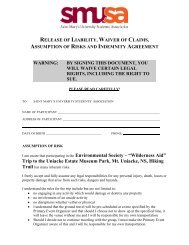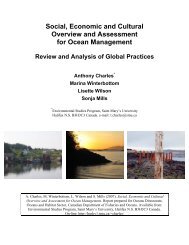Community Fisheries Management Handbook - Saint Mary's University
Community Fisheries Management Handbook - Saint Mary's University
Community Fisheries Management Handbook - Saint Mary's University
You also want an ePaper? Increase the reach of your titles
YUMPU automatically turns print PDFs into web optimized ePapers that Google loves.
“We are vulnerable without legislation, policy and regulation (the force of<br />
law). <strong>Fisheries</strong> organizations and coastal communities need to work closely<br />
together in the process of developing or impacting policy.” Mary Keneally,<br />
RCIP Project, September 2003).<br />
This chapter is about how community-based fisheries management<br />
organizations can influence and change the policies that impact their<br />
communities.<br />
This chapter talks about:<br />
Problem identification and analysis<br />
Setting policy objectives<br />
Identifying policy alternatives<br />
Advocacy and lobbying<br />
Public education<br />
Much of the information in this chapter is adapted from research papers<br />
and resources prepared by the Rural Communities Impacting Policy (RCIP)<br />
project (www.ruralnovascotia.ca).<br />
WHAT IS POLICY?<br />
Policy is the body of formal or informal practices that dictate how existing<br />
rules and legislation are implemented. Most government legislation (such<br />
as the Canadian <strong>Fisheries</strong> Act) is accompanied by policy documents that<br />
guide bureaucrats in applying the law. Usually, in community-based fisheries<br />
management, when people say that they want to make policy change,<br />
they are referring to changing the approaches, practices and operational<br />
guidelines of governmental fisheries regulatory agencies such as DFO<br />
(Canada) or NMFS (U.S.).<br />
Policy also includes the more informal institutional policies that influence<br />
how rules and regulations are interpreted – for example, whether or not<br />
docking fees are always collected from recreational boaters at a public wharf.<br />
However, this chapter deals mainly with changing more formalized government<br />
policy, rather than the informal practices – even though the latter also<br />
influence efforts towards community-based fisheries management.<br />
WHY IS CHANGING POLICY IMPORTANT?<br />
Many different kinds and levels of policy have an impact on fisheries<br />
and coastal communities. Fishing livelihoods are affected by the policies<br />
of various levels of government, corporations, and their own fishing organizations.<br />
Many coastal residents believe that bad government policy is the main<br />
reason for the decline of their fishery and their communities. They have<br />
felt powerless against top-down decision making and its impacts. Thus,<br />
changing unpopular policies through community-based approaches is empowering.<br />
People realize they can influence the policy making process.<br />
<strong>Community</strong>-based fisheries management is difficult under the current<br />
regulatory framework of many fisheries. Local efforts to change restrictive<br />
government policy are creating small spaces where community-based approaches<br />
are possible.<br />
HOW TO DO IT<br />
The reality is that changing policy is a slow process and can be discouraging<br />
for community members. Unfortunately, the changes that need to<br />
happen often will not occur in the time frame to be most useful to those<br />
who started trying to bring about change. However, there are positive steps<br />
that can be taken, and the main focus of this chapter is on how community<br />
members can be proactive in trying to develop and change policy.<br />
There are many different groups and interests working to shape public<br />
policy to meet their own needs, and those working for communitybased<br />
fisheries management are but one part of a large and complex policy<br />
change process.<br />
There are many occasions when community groups are not actively<br />
shaping policy, but instead have to react to policy imposed by government,<br />
and are trying to prevent or minimize negative impacts on their<br />
communities from that policy. A way for community-based management<br />
groups to do this is by participating in policy consultations or reviews<br />
C O M M U N I T Y F I S H E R I E S M A N AG E M E N T H A N D B O O K


